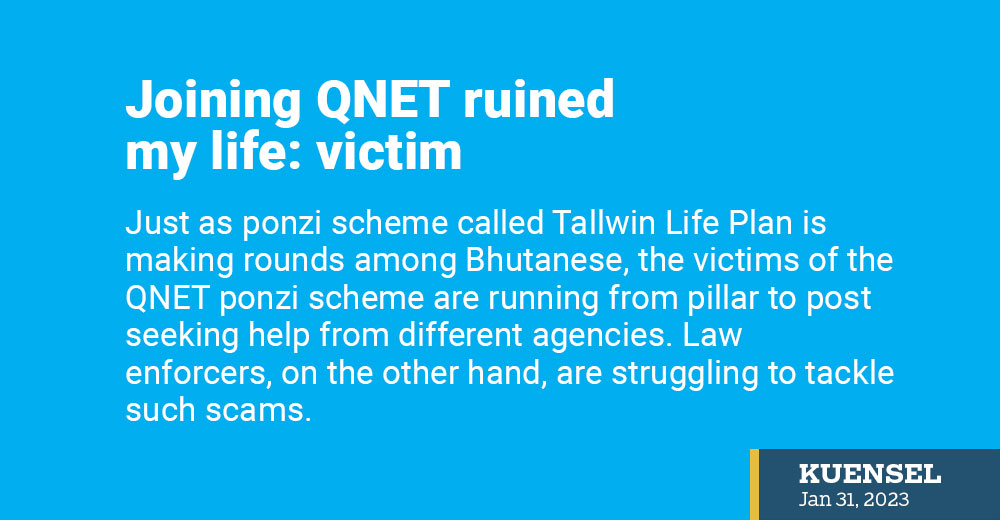Choki Wangmo | Tsirang
Just as ponzi scheme called Tallwin Life Plan is making rounds among Bhutanese, the victims of the QNET ponzi scheme are running from pillar to post seeking help from different agencies. Law enforcers, on the other hand, are struggling to tackle such scams.
Tashi, a de-suup, heard about QNET from her childhood friend, Sangay while on border duty last year. The friend told her that she would easily earn Nu 40,000 in a month if she registered as her downline member. Tashi was excited.
QNET is a Hong Kong-based business owned by Qi Company. It is claimed to be a multi-level marketing business and e-commerce-based direct-selling company. A person has to pay Nu 120,000 to become a member or independent representative (IR).
Times were challenging for Tashi, a high school graduate whose family’s expenses had increased in recent years. Tashi wanted to help her parents and pay her sister’s college fees. Her salary wasn’t enough.
She did not know the business but trusted her friend. She registered as her friend’s downline member in January last year. She attended a four-day training but did not yet know the terms and conditions of the business. She sat for a two-hour interview.
Two months after signing an agreement, she made a payment of Nu 120,000. She borrowed the amount from her uncle and mother.
She waited for the returns as promised by her Sangay. After four months, Tashi was impatient and asked her friend. Sangay told her not to expect any returns until she registered downline members with her. Coincidentally, around that time, she met another de-suup who joined QNET and shared about the business.
Just like Tashi, the de-suup from Dagana borrowed the amount from her neighbours. He told her that he was struggling to repay the amount. His financial burden increased with a sick mother and a newborn baby.
“I realised that the online scheme supported by many Bhutanese was victimising vulnerable groups like myself. Unemployed and illiterate people with promises of huge financial returns,” she said.
“Sadly, I came to know that Sangay knew about the scam. She didn’t even try to stop it. She lured me into the scam as her elder sister was one of the promoters in the country,” she added.
Both Tashi and the de-suup from Dagana did not want downline members but wanted out of the business with their invested amount returned. “I cannot face my mother after squandering her hard-earned money,” Tashi said.
The IRs are required to maintain and recruit downline members in a binary model where members need two direct recruits with subsequent recruits (known as downlines) placed under the direct recruits as well as the recruits under them.
They suspect that there are more de-suups in the scam. She said that she talked with some who told her that the business was doing fine. According to the members of the scheme, there are more than 200 Bhutanese individuals including those living abroad as members.
Tashi was soon removed from the group’s social media accounts.
She then reached out to the promoter, Sangay’s sister who frequently travelled abroad. After getting no response, she sought help from Norbugang police station in Samtse. She was told that the police did not have the resources to handle such cases and referred her to the Office of Consumer Protection (OCP).
In a recent interview with Kuensel, police officials said that online scams are difficult to track and can take a long time to be detected because it requires producing a lot of supporting evidence and documentation.
OCP declared the scheme illegal in September last year, asking all promoters and members of QNET to immediately discontinue the promotion of the scheme and recruitment of the downline members.
An official from OCP asked the promoter to refund the money to Tashi. The promoter promised the official that she would repay the amount. “She drafted an agreement but there were no witnesses. She blamed me saying that I did not put the effort into the business.”
For a few months, Tashi had been seeking help from a legal office in Gelephu.
Authorities concerned had been issuing advisories about the online scams and schemes. Last year, BtCIRT in collaboration with the Ministry of Energy and Natural Resources, and the Royal Monetary Authority (RMA) issued an advisory asking people to refrain from joining such practices and report it to the authorities.
Recently, RMA said that the public should refrain from engaging in investment if any scheme has no genuine product or services sold, emphasises recruiting members down the line, and promises high returns within a short period.


